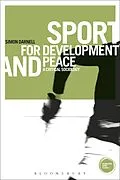This book is available as open access through the Bloomsbury Open Access programme and is available on www.bloomsburycollections.com.
The role of sport in development initiatives has grown dramatically over the last five years, now finding a place in the UN's millennium development goals. In Sport and Development for Peace, Simon Darnell outlines the most recent sociological research on the role of sport in development initiatives.
The book analyses the relationship between sport and international development and looks at what this reveals about socio-political economy. It addresses a gap in the literature by focusing on issues of politics, power and culture, particularly looking at volunteer experience, mega-sporting events and sporting celebrity in the context of development. Darnell questions the belief that sport can offer a 'solution' to enduring development issues. Drawing on the latest empirical research, the book is a thorough and timely analysis of the social and political implications of tying sport to development.
Autorentext
Simon Darnell is a Lecturer in Sport in the School of Applied Social Sciences at Durham University, UK. His main research focus is the social and political dimensions of sport-for-development. He also conducts research into international sport policy, with a focus on Cuba, as well as the role of sport in promoting global citizenship. He is the author of Sport for Development and Peace: A Critical Sociology (2012, Bloomsbury Academic). His work has also been published in the Sociology of Sport Journal, Development in Practice, and the Journal of Global Citizenship and Equity Education.
Inhalt
Sport and International Development: A Critical Sociology
Simon C. Darnell, PhD.
Introduction - Situating sport-for-development and the SDP movement Connecting 'Sport' to 'International Development'
1. Sport-for-Development: Historical and Political Context
2. Sport for Development and Peace (SDP): terms and tenets
3. Stakeholders
4. A Theoretical Approach to SDP
5. Methodology
6. Paradoxes of development and paradoxes of sport for development
7. SDP: A New Social Movement?
8. Overview of the Book
Chapter 1 - Sport Sociology and the SDP movement
1. Introduction
2. Hegemony theory and the Sociology of Sport
3. Foucauldian theories of power and sport
4. Neo-Marxist Discourse
5. Sport and the Post-colonial
6. Sport and/as Human Rights
7. Conclusions: Implications for sport in development
Chapter 2 - International Development Studies and SDP: syntheses and opportunities
1. Introduction
2. A Short History of Development Practice and Theory
3. The Political Economy of Development Inequality
4. Culture, Development and SDP in the post-colonial
5. Development as Struggle
6. Conclusion
Chapter 3 - The SDP intern/volunteer experience
1. Introduction
2. Subjectivities in Development and SDP
3. Interns' experiences
4. Conclusions
Chapter 4 - SDP, development theory, and policy & politics
2. Major Issues
2.1 First World/Third World
2.2 Modernization residue
2.3 Relations of power
2.4 Sustainability
2.5 Monitoring and Evaluation
3. The Political Orientation of SDP
Chapter 5 - Sport, international development and mega-events
1. Introduction
2. The Socio-Political Economy of Sports mega-events
3. The Development Agenda of Sports Mega-events in the South
4. Three theses for understanding sports mega-events in/as development
5. Sports mega-events: Possibilities and Limitations
6. Future Research
7. Conclusion
Chapter 6 - Sport and international development: investigating sporting celebrity
1. Introduction
2. Celebrity, Development, Sport: Possibilities and Pitfalls
3. Sporting Celebrity in SDP: Insights from the Field
3.1 Drawing attention to development
3.2 Raising capital
3.3 Sport organizations and philanthropy
3.4 Role modelling -
3.5 Celebrity Athletes and the Politics of Change
4. Conclusion: Critical Considerations
Chapter 7 - Conclusion: Critical praxis and pedagogy in SDP
1. Introduction
2. Summary of arguments
3. A Sociological Vigilance in SDP
4. Critical Praxis
5. Critical Pedagogy
6. Final thoughts
